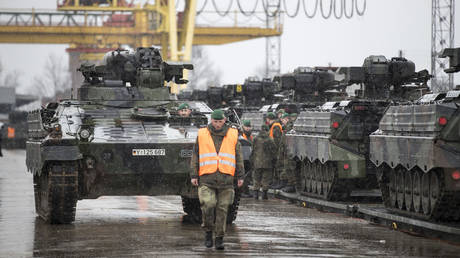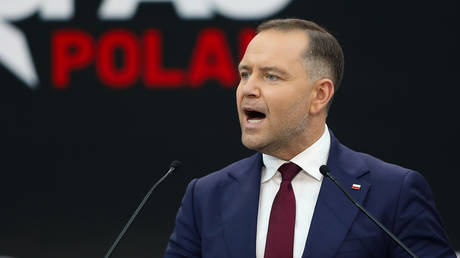
A deal to send 100 old military vehicles to Ukraine has been beset by internal division and international complications
The German government will decide soon on whether to approve the delivery of 100 Marder infantry fighting vehicles to Ukraine, Reuters reported on Monday. The shipment, which would be Germany’s first tranche of heavy weaponry delivered to Kiev, has been delayed by government indecision and legal constraints.
Defense manufacturer Rheinmetall has asked for government approval to export the vehicles to Ukraine, Reuters reported, citing a source within the German defense industry. Another government source told the agency that a decision will come from Berlin soon.
Designed in the 1960s and fielded by the German military since 1971, the Marders will need refurbishment before delivery, Reuters’ source added.
Earlier in April, Chancellor Olaf Scholz said that Germany would send only “correct and reasonable” weapons to Kiev, adding that there have been no plans to send “offensive” weapons, such as tanks, notwithstanding repeated Ukrainian requests. Foreign Minister Annalena Baerbock then urged the West to provide Kiev with heavy weaponry and appeared to criticize Scholz, stressing that “now is not the time for excuses.”
As chair of Germany’s national security council, Scholz has final say on the deal. However, he has thus far refused to give his approval or or deny it.
Further complicating the matter, Switzerland’s State Secretariat for Economic Affairs (Seco) has reportedly stepped in to scupper the deal. As the ammunition for the Marders is Swiss-made, its re-export by Germany would require Swiss approval, which, according to a report in the Sonntags Zeitung newspaper on Sunday, has been rejected on grounds of Switzerland’s military neutrality.
“Seco received two requests from Germany to pass ammunition [it]previously received from Switzerland on to Ukraine,” the secretariat confirmed to the newspaper. Both requests “have been rejected with a reference to Swiss neutrality and bounding rejection criteria of the legislation on military equipment,” the Swiss authorities added.
Despite the delayed delivery of the Marders, Germany has already bucked decades of conflict-averse foreign policy by sending thousands of anti-tank weapons to Ukraine and hiking military spending. While supporters of Kiev argue that Berlin’s arms supplies have been inadequate, a group of prominent German politicians and public figures sent the government an open letter on Saturday urging Berlin to cease all weapons shipments to Ukraine.
Foreign arms deliveries, the signatories wrote, are prolonging a bloody conflict that Ukraine “has little chance of winning.”




